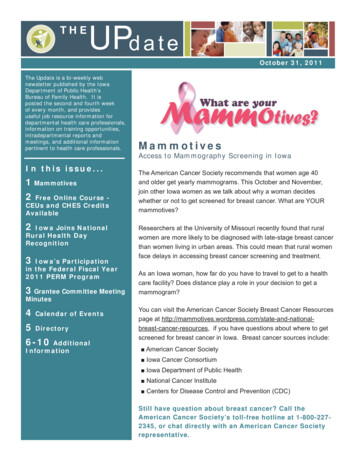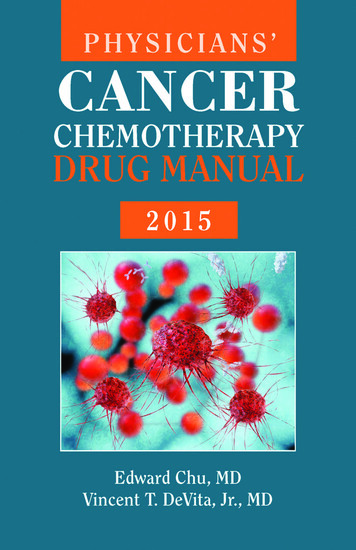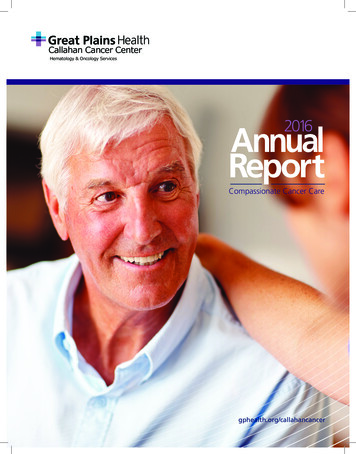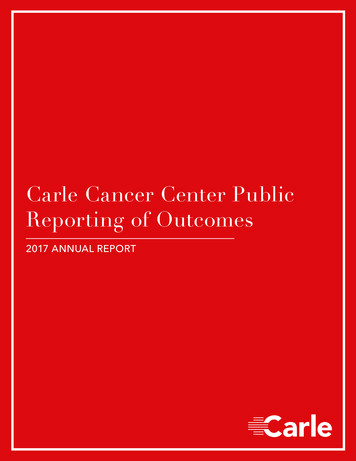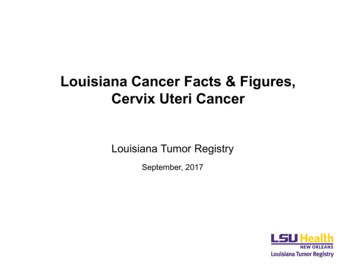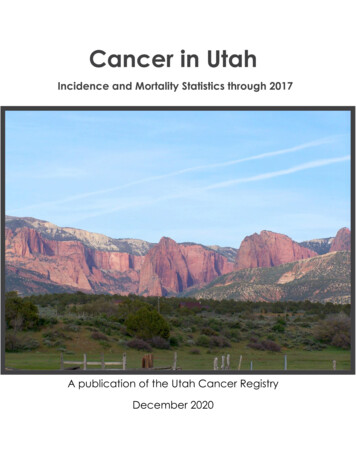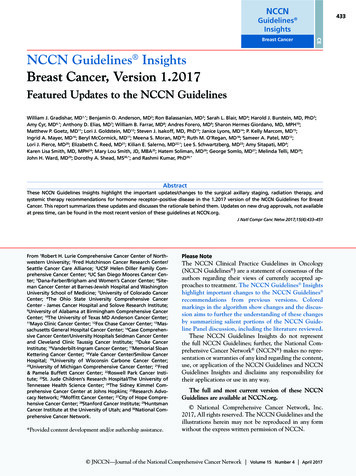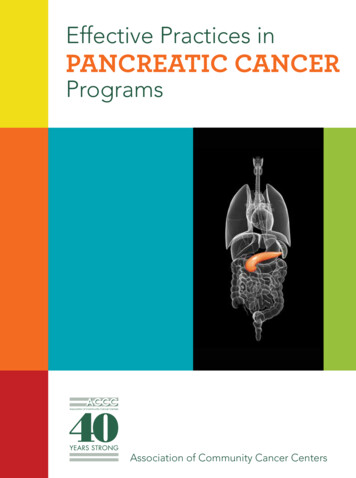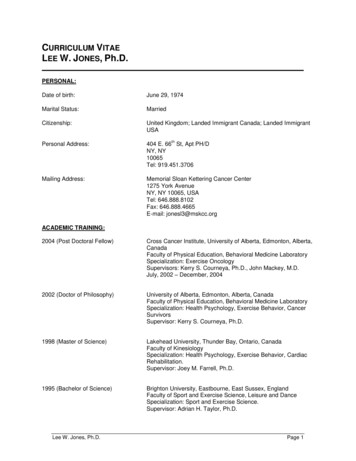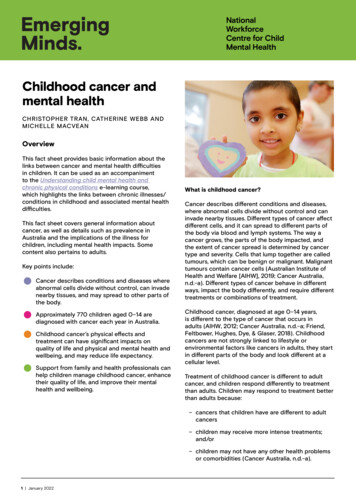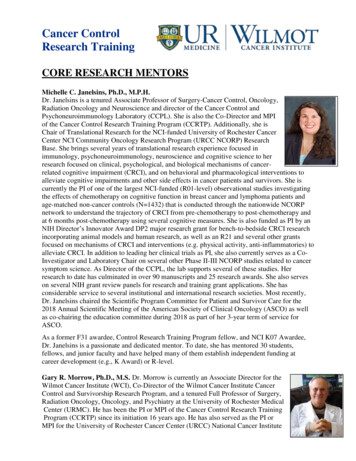
Transcription
Cancer ControlResearch TrainingCORE RESEARCH MENTORSMichelle C. Janelsins, Ph.D., M.P.H.Dr. Janelsins is a tenured Associate Professor of Surgery-Cancer Control, Oncology,Radiation Oncology and Neuroscience and director of the Cancer Control andPsychoneuroimmunology Laboratory (CCPL). She is also the Co-Director and MPIof the Cancer Control Research Training Program (CCRTP). Additionally, she isChair of Translational Research for the NCI-funded University of Rochester CancerCenter NCI Community Oncology Research Program (URCC NCORP) ResearchBase. She brings several years of translational research experience focused inimmunology, psychoneuroimmunology, neuroscience and cognitive science to herresearch focused on clinical, psychological, and biological mechanisms of cancerrelated cognitive impairment (CRCI), and on behavioral and pharmacological interventions toalleviate cognitive impairments and other side effects in cancer patients and survivors. She iscurrently the PI of one of the largest NCI-funded (R01-level) observational studies investigatingthe effects of chemotherapy on cognitive function in breast cancer and lymphoma patients andage-matched non-cancer controls (N 1432) that is conducted through the nationwide NCORPnetwork to understand the trajectory of CRCI from pre-chemotherapy to post-chemotherapy andat 6 months post-chemotherapy using several cognitive measures. She is also funded as PI by anNIH Director’s Innovator Award DP2 major research grant for bench-to-bedside CRCI researchincorporating animal models and human research, as well as an R21 and several other grantsfocused on mechanisms of CRCI and interventions (e.g. physical activity, anti-inflammatories) toalleviate CRCI. In addition to leading her clinical trials as PI, she also currently serves as a CoInvestigator and Laboratory Chair on several other Phase II-III NCORP studies related to cancersymptom science. As Director of the CCPL, the lab supports several of these studies. Herresearch to date has culminated in over 90 manuscripts and 25 research awards. She also serveson several NIH grant review panels for research and training grant applications. She hasconsiderable service to several institutional and international research societies. Most recently,Dr. Janelsins chaired the Scientific Program Committee for Patient and Survivor Care for the2018 Annual Scientific Meeting of the American Society of Clinical Oncology (ASCO) as wellas co-chairing the education committee during 2018 as part of her 3-year term of service forASCO.As a former F31 awardee, Control Research Training Program fellow, and NCI K07 Awardee,Dr. Janelsins is a passionate and dedicated mentor. To date, she has mentored 30 students,fellows, and junior faculty and have helped many of them establish independent funding atcareer development (e.g., K Award) or R-level.Gary R. Morrow, Ph.D., M.S. Dr. Morrow is currently an Associate Director for theWilmot Cancer Institute (WCI), Co-Director of the Wilmot Cancer Institute CancerControl and Survivorship Research Program, and a tenured Full Professor of Surgery,Radiation Oncology, Oncology, and Psychiatry at the University of Rochester MedicalCenter (URMC). He has been the PI or MPI of the Cancer Control Research TrainingProgram (CCRTP) since its initiation 16 years ago. He has also served as the PI orMPI for the University of Rochester Cancer Center (URCC) National Cancer Institute
(NCI) Community Oncology Research Program (NCORP) Research Base for over35 years under both the NCI Community Clinical Oncology Program (CCOP) and NCORPprograms. He is the Dean’s Professor of Oncology and the Distinguished Professor of SupportiveCare in Cancer in the Medical Center.Dr. Morrow has been actively involved in research since 1975 with a primary, sustained focus onpharmaceutical and behavioral interventions for the management of symptoms and side effectsassociated with cancer and its treatments. He is also an internationally recognized expert in thearea of clinical trial methodology in cancer control. His research has received continuous peerreviewed funding since 1976 and has resulted in more than 250 peer-reviewed publications. Hehas carried out investigator-initiated federal grants from NCI, NCCAM, the US Army, and theAmerican Cancer Society research looking at cancer treatment-induced side effects such asnausea, emesis, and fatigue, and is the MPI of the University of Rochester Medical Center NCIfunded T32 Cancer Control Research Training Curriculum grant. He has also conducted clinicaltrials with the Nathan Cummings Foundation, and pharmaceutical companies HelsinnPharmaceuticals, GTx Inc,, Alza Pharmaceutical, Pfizer, Glaxo, Janssen, and Upjohn. He hasserved on numerous (and chaired 13) ad hoc and permanent grant review sections for NIH, ACS,and the Department of Defense Medical Command, and was the founding Chair of thePsychosocial and Behavioral Research Review Committee of the American Cancer Society. Dr.Morrow works closely with investigators within the WCI, the University of Rochester at large,and other research and academic institutions to develop relevant concepts and protocols in thearea of cancer control and cancer care delivery.Karen M. Mustian, Ph.D., M.A., M.P.H., A.C.S.M., F.S.B.M. Dr. Mustian is atenured Full Professor in the Department of Surgery, a Dean’s Professor of Oncology,MPI and Co-Director of the University of Rochester Cancer Center (URCC) NCICommunity Oncology Program (NCORP) Research Base, Co-Director of CancerControl and Survivorship for the Wilmot Cancer Institute, and Director of the PEAKHuman Performance Clinical Research Laboratory. She is internationally renowned inthe fields of behavioral oncology, exercise oncology, and cancer control andsurvivorship with over 15 years of experience conducting large, multi-center, phase IIand III clinical trials to treat toxicities and side effects experienced by cancer patientsand survivors. Dr. Mustian has served or is serving as the PI on several local andnationwide randomized clinical trials funded by the NCI, NCCAM, OCCAM, NINR, and DOD.She has been continuously funded since 2004, has been awarded over 61 million in peerreviewed funding, and has published over 135 peer-reviewed articles.Dr. Mustian has pioneered methods for testing interventions of yoga, exercise, and cognitivebehavioral therapy as well as methods for testing physiology and conducting translationalresearch within the nationwide URCC NCORP Research Base network. Notably, she hasdesigned and tested two behavioral interventions for cancer patients and survivors, respectively:EXCAP (Exercise for Cancer Patients) and YOCAS (Yoga for Cancer Survivors). Mostrecently, Dr. Mustian conducted a landmark meta-analysis comparing the four most commontreatments for cancer-related fatigue. This study showed that exercise and psychologicalinterventions are more effective than pharmaceutical interventions. Her work was recognizedwith two outstanding research awards and the publication in JAMA Oncology was the most citedpaper for the year 2017. In addition, this work was recognized by the American Society ofClinical Oncology (ASCO) as one of the most significant advances in cancer care for 2018.Dr. Mustian has mentored more than 80 undergraduate, graduate, and post-graduate students aswell as 40 junior faculty, 21 of whom received prestigious Career Development Awards from NIH
(K awards), the American Cancer Society (Mentored Research Scholar Awards), and the URMCClinical and Translational Science Institute (KL2s).Supriya Gupta Mohile, M.D., M.S. Dr. Mohile is a board-certifiedgeriatrician and oncologist and is actively moving forward the field of geriatriconcology. She completed internship, residency, and fellowships inhematology/oncology and geriatrics at University of Chicago Medical Center,where she also earned a Master's degree in health outcomes research. Dr.Mohile's fellowship was funded by an American Society of Clinical Oncology(ASCO) and John Hartford Foundation initiative to train oncologists in the careof older patients. Her research interests include the evaluation of patterns of care, healthoutcomes, and quality of life related to treatment for systemic cancer in older patients. In 2013,she was awarded a Patient-Centered Outcomes Research Institute (PCORI) Award and aNational Cancer Institute (NCI) R01 to evaluate whether geriatric assessment can improveoutcomes of older patients with cancer. She directs the Specialized Oncology Care & Researchin the Elderly (SOCARE) geriatric oncology clinic at the University of Rochester/HighlandHospital and is an integral member of the University of Rochester Cancer Center (URCC) NCICommunity Oncology Research Program (NCORP) Research Base, which is directed by Drs.Gary Morrow and Karen Mustian. She leads the Cancer Care Delivery Research (CCDR) effortsin the Research Base and sits on the CCDR Steering Committee at the NCI. Dr. Mohile is anexpert in geriatric oncology with over 148 publications in this area. She serves on the editorialboard of the Journal of Clinical Oncology and is the Editor-in-Chief of the Journal of GeriatricOncology. She was the Chair for the ASCO Geriatric Oncology Task Force and the ASCOGeriatric Oncology Clinical Guideline panel. She was also recipient of the prestigious B.J.Kennedy Award for Scientific Excellence in Geriatric Oncology in June 2018. Dr. Mohileserves as a Core Mentor for the Cancer Control Research Training Program (CCRTP). Havingbeen a previous trainee in the program, she now fosters new ideas and supports mentees andother investigators in their scientific ambitions, especially in regard to concept development,protocol development, and disseminating data. Over the last several years, she has served asprimary mentor for five CCRTP trainees.Luke Joseph Peppone, Ph.D., M.P.H. Dr. Peppone is an Associate Professor ofOncology, Surgery, and Orthopaedics at the University of Rochester MedicalCenter (URMC). Dr. Peppone originally came to URMC to participate in theCancer Control Research Training Program. Since completing this position,he has transitioned to a tenure-track Assistant Professor. His research is in thearea of cancer control and survivorship with primary foci on investigating theinfluence of nutritional supplementation and exercise on toxicities and sideeffects (acute, chronic and late) stemming from cancer and its treatments including translationalfoci investigating psychoneuroimmunological and genetic mechanistic pathways. He is currentlyinvestigating the effects of high-dose vitamin D, marine ω-3 polyunsaturated fatty acids, guaraná(a Brazilian botanical product) supplementation, and medical cannabis. The effect of high-dosevitamin D supplementation is being tested on arthralgias, bone mineral density, and fatigueamong breast and prostate cancer patients on hormonal therapy. Both marine ω-3polyunsaturated fatty acids and guaraná supplementation are being tested for their effects onfatigue and cognitive issues. Over the past 11 years in the University of Rochester Cancer Center(URCC) group, Dr. Peppone has focused on clinical research for symptom management incancer patients with a focus on nutraceutical interventions such as high-dose vitamin D, highdose omega-3 supplementation, and guaraná. He has been awarded 3.3 million in independentfunding as principle investigator (PI) from NIH and ACS, has published 58 peer-reviewed
manuscripts, and has received more than 10 scientific awards from national and internationalassociations.Since completing the CCRTP, Dr. Peppone has been active in mentoring both pre- and postdoctoral students in cancer control. Dr. Peppone has had a mentoring role for two formerCCRTP trainees and now serves as the primary mentor for a current CCRTP fellow. In addition,Dr. Peppone has sat on four thesis committees for Master’s of Public Health and served as anexternal dissertation reviewer for the University of Canberra, Australia. In his research role, Dr.Peppone serves as the Chair of Pilot Studies for the URCC National Cancer Institute (NCI)Community Oncology Program (NCORP) Research Base. In this role, Dr. Peppone supervisesand coordinates the piloting of cancer control protocols and leads the effort to develop novel andearly stage therapy concepts, protocols, and pilot studies. He is also responsible for Novel andEarly Stage Therapy Development, including the facilitation and oversight of concepts for whichthere is little research in the literature, for early-stage interventions, and for protocols in whichthe intervention is established but not in the population the protocol seeks to study and/or for thesymptom being targeted. This position goes hand-in-hand with mentorship roles, as the vastmajority of trainees conduct their own pilot studies. Dr. Peppone works personally with alltrainees when designing and implementing their pilot work.Charles S. Kamen, Ph.D., M.P.H. Dr. Kamen is a clinical psychologist with a strongbackground and training in behavioral medicine, health disparities, and dyadicinterventions. His program of research specifically focuses on 1) cancer-related healthdisparities affecting sexual and gender minority (SGM; e.g., lesbian, gay, bisexual,transgender; LGBT) cancer survivors, and 2) behavioral interventions to address thesedisparities. He is director of the University of Rochester Cancer Control (URCC) group’s Community Engagement Training Laboratory (CENTRAL) and his signaturecurriculum, the Minority and Underserved Research, Action, and Learning (MURAL)Program, provides tools to investigators and coordinators to educate and recruit“invisible” and hard-to-reach minority participants (e.g., SGM, African American) to clinicalresearch. He has been awarded a K07 career development award from NCI focused explicitly onSGM cancer-related health disparities, and has also contributed to a range of behavioralinterventions to improve the health and well-being of cancer patients and survivors. Dr. Kamenis a former Control Research Training Program (CCRTP) fellow and has been involved with the(CCRTP) since 2012. Following his transition to tenure track, he has mentored two CCRTPfellows, both of whom were from minority/underrepresented (M/U) backgrounds, and both ofwhom have developed health equity focused protcols. Moving forward, Dr. Kamen willcontinue to develop studies to identify and address determinants of cancer disparities in clinicalresearch, including efforts to increase participation in underserved populations. Dr. Kamen iscommitted to training and mentoring the next generation of cancer control researchers toconsider minority and underserved populations when designing clinical trials, as well as developingstudies with a specific diversity and health equity focus.Sarah L. Kerns, Ph.D., M.P.H. Dr. Kerns is an Assistant Professor with appointmentsin Radiation Oncology (primary) and Surgery (secondary). She has over 10 years ofexperience conducting clinical translational research in cancer biology and cancercontrol and survivorship. During this time, she has published 38 peer-reviewedmanuscripts and two book chapters, has been PI or co-I of seven extramural grants, andhas mentored several undergraduate and graduate students. Dr. Kerns is also theprimary mentor to a Holman Pathway Scholar who is a resident in Radiation Oncology.She is involved in teaching in the graduate school and the Radiation Oncology residencyprogram. Her current research interests focus on identifying genetic risk factors for development
of radiotherapy toxicities and using this genetic information to better personalize care in theclinic. She is PI of a K07 Career Development Award from NCI and an SBIR Phase II awardfrom NIH that support this work. She is passionate about research as well as training the nextgeneration of clinical translational researchers.Eva Culakova, Ph.D. Dr. Culakova has over 15 years of experience working as abiostatistician in cancer research and she coauthored over 40 publications. She workedfor a national observational registry of cancer patients treated with chemotherapy,which studied patterns of cancer care delivery and toxic side effects of treatments. Shehas statistical experience in the design and analysis of both randomized, as well as,observational studies. She has a solid working knowledge of longitudinal data analysis,risk modeling, survival analysis, propensity score analysis, analysis of clustered data,systematic reviews, and meta-analysis. Her statistical methodology research interestsare related to risk stratification models, analysis of biomarker data (e.g., missingvalues due to detection threshold, multiple testing), and analysis of patient reportedoutcomes (PROs) such as symptoms data. She is highly interested in research oftreatment tolerability with a goal to develop reliable risk classification tools that are able toidentify vulnerable patients who are likely to develop side effects, thus allowing application ofearly preventive measures. She collaborated on the development of prediction models identifyingpatients with cancer at an increased risk of developing treatment related toxicities such asthromboembolism or neutropenia. Dr. Culakova joined the University of Rochester CancerCenter (URCC) National Cancer Institute (NCI) Community Oncology Research Program(NCORP) Research Base in January 2017. Since then, she has been actively collaborating withNCORP scientists and fellows on various projects, impacting quality of life of cancer patientsand survivors. She has contributed to the design of future studies, grant applications writing, andconcepts development, as well as statistical analysis of the existing studies, and alsopresentations of the results at the national and international meetings, and journals’ publications.Dr. Culakova also has considerable college teaching experience. In addition to working withsenior clinical professionals, as a biostatistician she has productively collaborated with juniorfaculty and trainees, several of whom are now successfully established clinical researchers.Paula Cupertino, Ph.D. Dr. Cupertino is a University of Rochester Medical CenterProfessor of Public Health Sciences and Oncology and Wilmot Cancer Institute’s firstAssociate Director of Community Outreach, Engagement and Disparities. Dr.Cupertino leads efforts to strengthen and expand Wilmot’s research and connectionsacross its 27-county catchment area in upstate New York. A social behavioral scientist,Dr. Cupertino has focused her research on health disparities in underserved andminority communities, primarily among Latinos and immigrants. Much of her workhas been in tobacco control, improving smoking cessation and access to cessationtreatments using a community-based approach. She also serves as a member of theMedical Center Executive Committee for Diversity and Inclusion and the UR CommunityEngagement Committee. As part of both efforts, Dr. Cupertino seeks to bring additionalresources, infrastructure and opportunities to build a community-based research program incollaboration with UR departments, divisions and centers. Throughout her career, she has hadmore than 40 peer-reviewed publications, and she has been continuously funded for her researchsince 2003.
Kim Van Orden, Ph.D. Dr. Van Orden is a clinical psychologist and AssociateProfessor in the Department of Psychiatry at the University of Rochester MedicalCenter. She is the Principal Investigator of the HOPE Lab (Helping Older PeopleEngage) and Co-Director of the Rochester Roybal Center for Social Ties and Aging.Her lab conducts randomized trials of suicide prevention interventions to promotesocial engagement and healthy aging. Her research has been funded by the NationalInstitute of Mental Health, the National Institute on Aging, and the Centers for DiseaseControl and Prevention. Dr. Van Orden mentors students and fellows, co-directs anNIH-funded research fellowship in suicide prevention, and maintains an active clinicalpractice providing evidence-based psychotherapy to older adults.Additional MentorsDavid H. Adler, M.D., M.P.H. Dr. Adler is an emergency physician, educator and researcher.He received his medical training at the University of California at San Francisco and hisresidency training in emergency medicine at Highland General Hospital in Oakland, California.Dr. Adler has been core faculty in the University of Rochester’s emergency medicine residencyprogram since 2006. He is the Director of Emergency Medicine Research and also directs theSAEM-approved Emergency Medicine Research Fellowship and the International EmergencyMedicine Fellowship. He also serves as Chair of the medical school’s International MedicineFaculty Advisory Committee.Nancy M. Bennett, M.D., M.S. Dr. Bennett is the co-Director and co-Principal Investigator ofthe University of Rochester’s Clinical and Translational Science Institute (CTSI). Her researchfocuses on T3, T4 research related to population health, community-based participatory research,practice based research, and education and training related to population health and communityengagement. She is also the Director of the Center for Community Health & Prevention(CCHP), a multidisciplinary academic center focused on community health improvementthrough research, policy, and prevention services, including cancer prevention. The CCHP leadsthe community/population health mission and community engagement for the Medical Center,working with all schools and many departments on research and program implementation toimprove health and engage the community.Joe Chakkalakal, Ph.D. Dr. Chakkalakal’s research utilizes murine models to study theregulation, and contributions of stem cells to the maintenance of skeletal muscle regenerativepotential during aging, in the context of androgen deprivation, and in models of pediatric cancertreatment. Sarcopenia is the abnormal loss of skeletal muscle mass, and function commonlyobserved in the elderly population the onset of which is accelerated upon androgen deprivationand in pediatric cancer survivors. A significant contributor to falls, frailty and loss in functionalmobility, disabilities related to sarcopenia are a burgeoning cost to the US healthcare system.Hence, the identification of factors that promote skeletal muscle maintenance is of criticalimportance.Yeates Conwell, M.D. The primary focus of Dr. Conwell’s research for the past 25 years hasbeen the study of suicide and its prevention, with an emphasis on later life and on the role ofprimary care and community-based aging services in the detection and management of mentaldisorders and suicide risk in older adults. He is Professor and Vice Chair, Co-Director of theCenter for the Study and Prevention of Suicide and Director of the Geriatric Psychiatry Program
of the Department of Psychiatry, and Director of the University of Rochester Medical Center'sOffice for Aging Research and Health Services. Training and mentorship have always beencentral to his work. Dr. Conwell was Co-PI of an NIMH-funded U24 to develop a web-basedmentorship structure for young investigators from diverse backgrounds nation-wide, recipient ofa K24 award from NIMH, a faculty member on several other T32s, and primary research mentorand sponsor for nine K awardees and many other pre-and postdoctoral scholars in suicideresearch in the U.S. and abroad.Ronald Epstein, M.D. Dr. Epstein is residency-trained as a family physician, with boardcertification in family medicine and palliative care, clinically trained as a family therapist, and aprofessor of family medicine, psychiatry, oncology, and medicine (palliative care). He has over250 publications, 23,000 citations, h-index of 63 and i-10 index of 152. He has published manyfirsts—studies of communication in the contexts of AIDS, mental health and advanced cancer;qualitative health services research; a highly-cited 2007 NCI monograph on communication incancer; 4 of the 50 most widely-cited articles in medical education in the past 100 years—andintroduced the concepts of mindful practice and shared mind into the medical literature. Dr.Epstein is currently a senior communication and health services researcher with a focus onpragmatic strategies for improving communication with patients with serious and stigmatizedillnesses and addressing health professionals’ self-awareness and burnout.Jonathan Friedberg, M.D. As Director of the Wilmot Cancer Institute, Dr. Friedberg has had alongstanding interest in development of novel rational therapeutic combinations for lymphoma.His work on Syk inhibition represented the first clinical experience of B-cell receptor signalingcascade blockade in the treatment of lymphoma, and resulted in the Scholar in Clinical ResearchAward from the Leukemia and Lymphoma Society. He ran the clinical trials core of ourLymphoma SPORE, and has served as PI of several national clinical trials in lymphoma. Dr.Friedberg lead the SWOG lymphoma committee through the NCI NCTN, ran two nationalstudies in non-Hodgkin lymphoma through SWOG, and was the co-leader of the most recent USIntergroup trial in advanced Hodgkin lymphoma. As a member of the National LymphoCareStudy Steering Committee, and former PI of the NCCN NHL Database, he has experiences toassist trainees with clinical trial execution and database interpretation.John Foxe, Ph.D. Dr. Foxe is the Director of The Ernest J. Del Monte Institute forNeuroscience. He has a history of basic research studies of the neurophysiology of multisensoryintegration and attention. In parallel, he has worked to translate new understanding generated inthis basic research program to advance understanding of the neuropathology that underliesvarious neurological, neurodevelopmental and psychiatric disorders. His work places specialemphasis on the identification of endophenotypic markers in childhood neurological andneuropsychiatric diseases and in the linking of these biomarkers to the underlying genotype. Dr.Foxe has a consistent history of NIH, NSF, industry and foundation funding, as well as a solidrecord of productivity ( 260 publications; H-Index 81). His lab employs an integrated multimethodological approach, using high-density electrophysiology, structural and functionalneuroimaging, imaging genomics, eye-tracking, psychophysics, and virtual reality to understandthe neural basis of fundamental sensory-perceptual and cognitive functions.Kathi Heffner, Ph.D. Dr. Heffner’s research interests and expertise pertain to the examinationof psychosocial modulation of physiological responses to stress, immunological/inflammatorydysregulation, and longer-term health outcomes. Her current work aims to identify howphysiological adaptation to stress alters immune and inflammatory activity, and the psychosocialfactors that moderate these pathways. She has two NIH-funded studies that have recently come
to completion to assess the role of sleep disturbance in psychoneuroimmunological mechanismscontributing to depressive and anxiety symptoms in trauma-exposed individuals (R01), as well asolder adults’ pain (R21). Currently, Dr. Heffner has two R01s aimed at testing two approachesto regulating stress in caregivers of a spouse with Alzheimer’s disease (AD) to, in turn, mitigatethe effects of chronic stressors on immune aging.David Linehan, M.D. Dr. Linehan is the Seymour I. Schwartz Professor and Chairman ofSurgery at the University of Rochester Medical Center. His academic focus and clinicalexpertise has centered on translational research to improve outcomes in patients with pancreascancer. He strives to create a patient-centered, team-oriented and empowering environment thatfosters both clinical/scientific excellence and innovation. Dr. Linehan’s clinical expertise is inthe multi-modality treatment of hepatobiliary and pancreatic malignancies. He is the author ofmany basic science and clinical manuscripts and he directs an NIH-funded laboratory whosefocus is on the tumor microenvironment and the cell-mediated immune response to pancreascancer. In addition, Dr. Linehan is an active translational researcher, serving as PrincipalInvestigator on several, on-going multi-modality clinical trials.Edith Lord, Ph.D. Dr. Edith Lord is a Professor of Microbiology and Immunology andOncology. Dr. Lord received her BA degree in microbiology from the University of Kansas in1970 and a Ph.D. degree in immunology from the University of California at San Diego in 1975.She was a postdoctoral fellow at the University of California at San Francisco. As a facultymember since 1976, Dr. Lord has demonstrated excellence as a scientist and dedication to thetraining of graduate students and postdoctoral fellows. Her research is focused on the generationof anti-tumor immunity, how immune cells function within the tumor microenvironment, andhow treatment modalities such as radiation therapy affect the immune response. Using mousemodel systems, she has helped establish a new paradigm that the generation of immunity is animportant component of the effectiveness of radiation in controlling tumors.Mark Noble, Ph.D. Dr. Mark Noble is a pioneering researcher in the fields of stem cell biologyand stem cell medicine. He currently holds professorships in Genetics, Neurology,Neurobiology and Anatomy at the University of Rochester School of Medicine and is theDirector of the University of Rochester Stem Cell and Regenerative Medicine Institute. Hislaboratory has made major contributions in multiple areas of research, beginning in 1983 whenhe co-discovered the first precursor cell isolated from the central nervous system (CNS). Dr.Noble and his colleagues then were the first to identify means of growing these cells in tissueculture, means of enabling expansion sufficient for carrying out repair, and the first to repairdamaged tissue (in this case, the demyelinated spinal cord) by purifying progenitor cells,expanding them outside the body and transpl
immunology, psychoneuroimmunology, neuroscience and cognitive science to her research focused on clinical, psychological, and biological mechanisms of cancer- . programs. He is the Dean's Professor of Oncology and the Distinguished Professor of Supportive . Dr. Mustian has mentored more than 80 undergraduate, graduate, and post-graduate .
